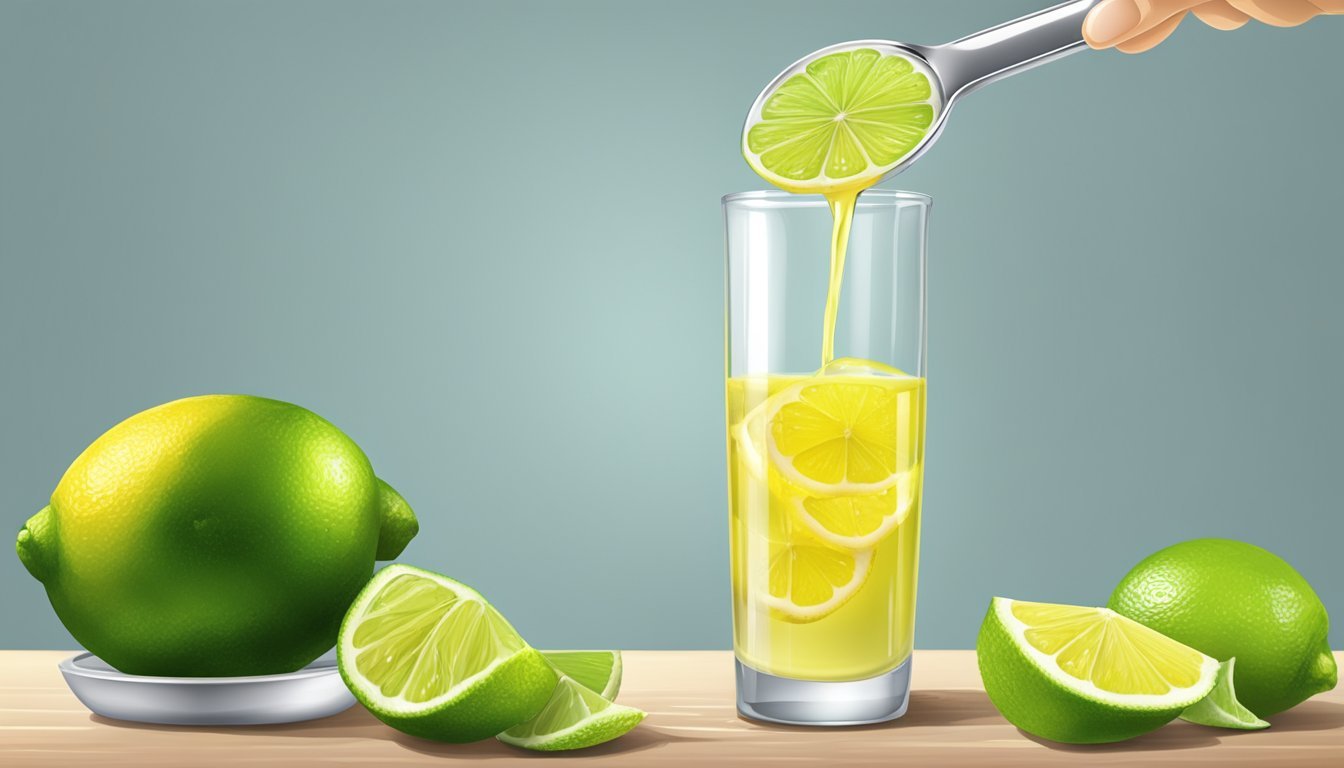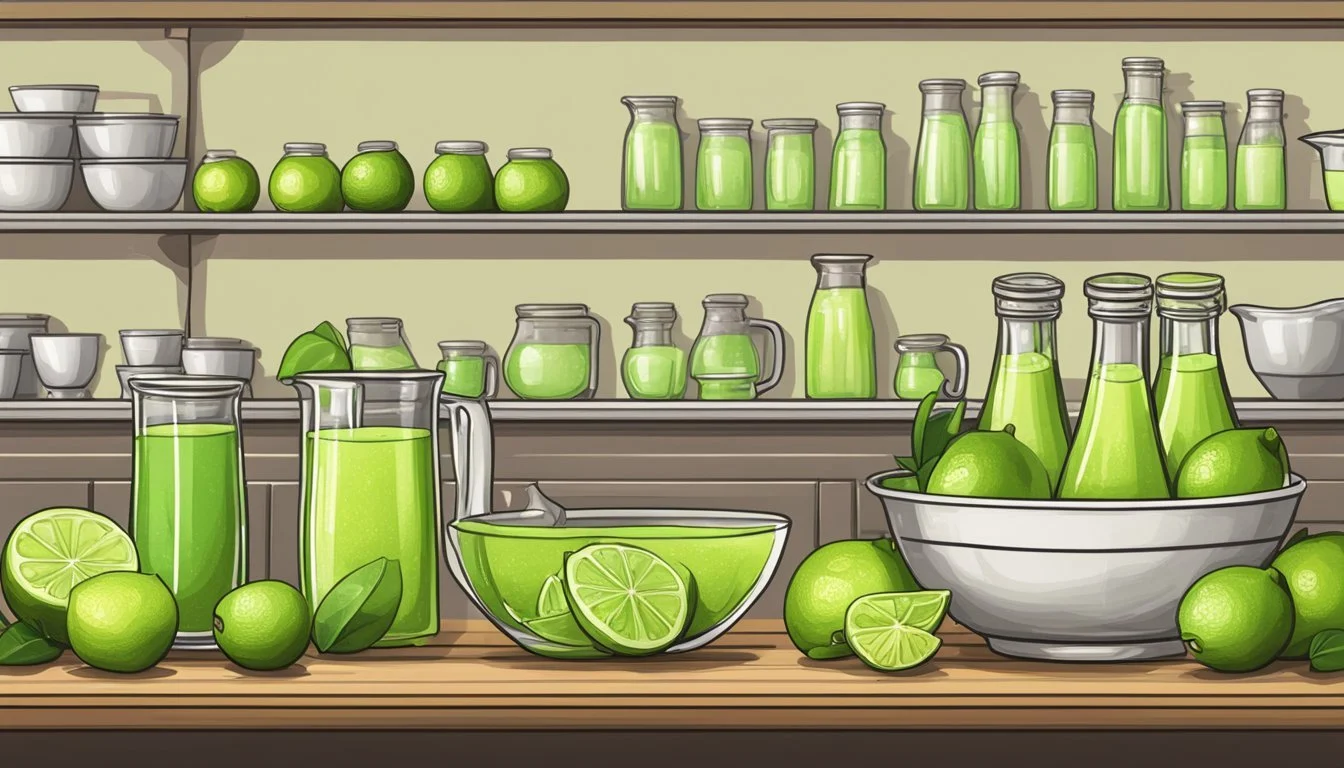How to Substitute Lime Juice for Lemon Juice
Simple Citrus Swap Tips
Substituting lime juice for lemon juice is a common practice in the kitchen, especially when one is in a pinch or prefers the taste of one over the other. Both citrus juices share similar acidity levels and flavor profiles, making them relatively interchangeable in many recipes. Lemon juice is known for its sweeter, more sour taste due to its higher citric acid content, and it boasts high levels of Vitamin C.
Lime juice, while also rich in Vitamin C, often imparts a more bitter and complex flavor with a slight sweetness that can enhance certain dishes uniquely. When a recipe calls for lemon juice, and a substitution is needed, lime juice can typically be used in a one-to-one ratio. However, because of the flavor intensity and a slightly higher acidity in lime juice, adjustments may be made to taste before adding the full amount suggested in the recipe.
Understanding Acidity and Flavor Profiles
When substituting lemon juice for lime juice, it is crucial to comprehend the varying acidity levels and inherent flavor distinctions to achieve the desired outcome in recipes.
Lemon vs. Lime: Acidity Levels
Lemons and limes are both high in citric acid, but lemons usually have a slightly higher acidity level, which can range from 5% to 6%. This difference in acidity can influence the overall taste and pH balance of a dish.
Flavor Differences: Sweetness and Tartness
Despite both being members of the citrus family, lemons and limes offer distinct flavors:
Lemons: Provide a stronger, more prominent tartness, with a bold, citrusy flavor that can dominate a recipe if not used carefully.
Limes: While still acidic, limes are typically less sour than lemons and can impart a more subtle, complex citrus note, sometimes with a slight sweetness.
The varying degrees of sweetness and tartness need to be accounted for when substituting one for the other to maintain the intended aroma and taste of the dish.
Substituting Lime Juice in Recipes
When substituting lime juice for lemon juice in recipes, one must consider the flavor profile and acidity. Lime juice can add a vibrant citrus note, but it is typically more acidic than lemon juice.
General Guidelines for Substitution
When using lime juice as a substitute for lemon juice, it is important to remember that lime has a slightly different flavor profile. It can impart a more tropical and sometimes floral note to a dish. Savory dishes and cocktails often embrace this change with minimal impact, while sweet recipes might need more consideration.
Adjusting the Sweetness and Tartness
To ensure the desired sweetness and tartness in a recipe when using lime juice, there might be a need to adjust the quantities of other ingredients. If a recipe calls for a teaspoon of sugar, for example, one might need to increase it slightly to balance the sharpness of lime juice.
For sweeter recipes: Add more sugar incrementally.
For savory dishes: Adjust salt or other seasoning to balance the acidity.
Substitution Ratios for Cooking and Baking
In cooking and baking, maintaining the wet-to-dry ratio is crucial. Here are the proposed substitution ratios for lime juice in various culinary applications:
Recipe Type Lemon Juice Lime Juice Notes Cooking 1 teaspoon 1 teaspoon Adjust seasoning as necessary Baking 1 teaspoon 1 teaspoon Add sugar if needed Marinades 1 teaspoon 1 teaspoon Lime's acidity is beneficial
One may need to tweak the amount of lime juice used based on the specific recipe and desired outcome. Always taste and adjust as necessary.
Alternative Citrus Substitutes
When substituting lime juice for lemon juice, one can also consider other citrus fruits for their distinct flavors and acidity levels. Each substitute brings its own unique characteristics that can complement or enhance different dishes and desserts (What wine goes well with desserts?).
Using Orange Juice and Grapefruit Juice
Orange Juice: Orange juice offers a sweeter and less acidic alternative to lemon juice, making it suitable for both savory dishes and desserts. When substituting, one can use:
Equal amounts for sweet dishes.
A slightly smaller quantity for dishes that require more tartness.
Grapefruit Juice: Grapefruit juice is tangier than orange juice, yet still milder than lemon juice. It works well in:
Salad dressings and marinades where a milder acidity is preferred.
Confectionaries and sweets that can benefit from a subtler citrus flavor.
Utilizing Citrus Zests and Extracts
Citrus Zest: Utilize lemon zest or the zest of other citrus fruits to introduce a concentrated burst of flavor without altering the liquid balance in a recipe. For each tablespoon of lemon juice, one can use:
1/2 teaspoon of zest as a general guideline.
Citrus Extracts: Lemon extract is a powerful flavoring made from lemon oil, often used in baking. Remember:
A few drops can typically replace a tablespoon of juice, but because of its intensity, it should be used sparingly.
Substitutes for Lemon Juice in Desserts
Lemon juice substitutes in desserts should complement the sweetness and flavors without overpowering them. Here's how one can incorporate different substitutes:
Orange juice can replace lemon juice to provide a gentle, sweet citrus note.
Grapefruit juice should be used carefully as its bitter undertone can alter the intended taste of the dessert.
Citrus extracts like lemon extract offer intense flavor and should be used in very small amounts to avoid bitterness.
For each substitute, tasting and adjusting the recipe incrementally is key to achieving the desired flavor profile.
Non-Citrus Lemon Juice Alternatives
When looking to replace lemon juice without the use of other citrus fruits, there are a few effective non-citrus alternatives that maintain the desired acidity in recipes.
Vinegar as a Substitution
Vinegar can be a versatile substitute for lemon juice in many recipes, providing the necessary tanginess and acidity. Here are a few types of vinegar and their respective substitution ratios:
White Vinegar: For a neutral flavor, white vinegar is an excellent choice. Use a ratio of 1:1 when replacing lemon juice.
Apple Cider Vinegar: With a milder taste and a slight fruitiness, apple cider vinegar can replace lemon juice using a 1:1 ratio.
White Wine Vinegar: Ideal for dressings and marinades, white wine vinegar offers a more complex flavor. Substitute with a 1:1 ratio.
Sherry Vinegar: This vinegar provides a richer, slightly sweet note. Use 1:1, but start with less and adjust to taste due to its distinct flavor.
Utilizing Cream of Tartar and Citric Acid
For those needing to mimic the sourness of lemon juice, cream of tartar and citric acid present as effective replacements.
Cream of Tartar: This acidic powder derives from tartaric acid. To replace a tablespoon of lemon juice, mix 1/2 teaspoon of cream of tartar with 1/2 teaspoon of water.
Citric Acid: This is a strong acidic powder and a potent substitute. Use 1/4 teaspoon of citric acid powder to replace 2 tablespoons of lemon juice. Always dissolve it in liquid before incorporating it into your dish.
Other Acidic Substitutes
There are alternative acidic ingredients that can stand in for lemon juice as a non-citrus option:
Vinegars: As previously mentioned, various vinegars serve as a robust substitution.
Sour drinks: Sour-flavored soft drinks or mixers can add the required acidity for beverages or liquid-based recipes.
Tart fruit juices: Non-citrus but still tart juices such as pomegranate can be used in equal amounts as lemon juice in certain recipes, though they will add a distinct flavor profile.
Application in Cooking and Beverages
When substituting lime juice for lemon juice in cooking and beverages, chefs and home cooks can achieve similar acidic brightness and flavor profiles, while considering slight variances in sweetness and acidity.
Marinades and Salad Dressings
In marinades, lime juice's acidic nature makes it an excellent tenderizer for meats, and its distinct zesty flavor can enhance the taste. For a typical citrus-based marinade, use a 1:1 substitution ratio when replacing lemon juice with lime juice. Salad dressings benefit from the fresh tang of lime and can be made using equal parts of lime juice in place of lemon juice, adding a tropical twist to vinaigrettes and creamy dressings.
Sauces, Soups, and Stews
Lime juice can bring a bright and tangy element to various sauces, adding a fresh layer of flavor. When integrating lime juice into soups and stews, it's important to add it at the end of cooking to preserve its vibrant flavor. A little can go a long way, so it's advisable to start with a smaller amount and adjust to taste.
Cocktails and Beverages
In the realm of cocktails and beverages, lime juice is often a preferred ingredient, especially in drinks like margaritas and mojitos. The substitution in cocktails is generally a direct 1:1 ratio. However, in sweet beverages or where a less pronounced citrus note is desired, one may start with a slightly smaller amount of lime juice and adjust according to taste.
Considerations for Baking and Sweets
When substituting lime juice for lemon juice in baking and sweets, it's crucial to consider how the change might affect the overall flavor profile. Lime juice can offer a similar sourness and citrus tang, but it has a distinctive taste that could influence the expected outcome of the recipe.
Baking with Lime Juice
In baked goods, the use of lime juice instead of lemon juice should be done with an understanding that the end product will have a slightly different flavor profile. Lime's more potent and sharp taste can bring a unique twist to classic recipes such as lemon bars or cakes. One should incorporate lime juice carefully to ensure that the resulting baked item retains the desired brightness without overpowering with a sour flavor.
Lemon Bars: When making lemon bars with lime juice, use a 1:1 substitution ratio, but be mindful that the taste will be markedly different.
Cakes: Lime juice can complement certain cake flavors, especially tropical ones. It enhances the taste without significantly altering the texture.
Sweet Treats and Dessert Applications
In desserts, the tartness of lime juice can compensate for the brightness typically provided by lemon juice. However, because the sour flavor of lime is more pronounced, it might become the dominant profile in sweet treats where lemon is meant to be subtle.
Citrus-Based Desserts: Use lime juice to give a tropical flair to desserts, balancing its tanginess with the sweet components of the dish.
Glazes and Icings: Start with a smaller quantity of lime juice and adjust to taste, ensuring not to overshadow the dessert's intended flavor.
By carefully adjusting the amount of lime juice used, chefs can achieve a balance of flavor in their baked and sweet creations.
Health Considerations and Nutrition
When substituting lime juice for lemon juice, one should consider the nutritional implications such as vitamin C content, calorie count, and potential dietary restrictions or allergies.
Vitamin C Content and Caloric Differences
Lime and lemon juices are both excellent sources of vitamin C, a crucial antioxidant for immune system function and skin health. Lemons typically provide about 53 mg of vitamin C per 100 g, while limes offer about 29 mg per 100 g. The difference in vitamin C content might be significant if a substitution is made in large quantities. In terms of calories, both juices are low-calorie with lemons containing approximately 29 calories and limes about 30 calories per 100 g, making either a calorie-conscious choice.
Allergies and Dietary Restrictions
Citrus allergies are relatively rare, but they do exist. Individuals with citrus allergies should avoid both lemon and lime juice. For those following strict dietary programs, it's essential to note that both lemon and lime juices are generally acceptable in vegan, vegetarian, gluten-free, and most other common dietary restrictions. Lime juice can be safely substituted in recipes without the concern of breaching these dietary constraints.
Both fruits are non-allergenic and align well with most dietary preferences, maintaining a high nutritional value with minimal caloric impact.
Preservation and Storage of Lime Juice
When preserving lime juice, one aims to retain its freshness and tangy flavor for as long as possible. Both canning and proper storage methods ensure that lime juice remains safe to use and as close to its original taste profile as possible.
Canning and Preserving with Lime Juice
Canning lime juice involves heating the juice and sealing it in sterilized jars to extend its shelf life significantly. It's crucial to use proper canning techniques to prevent the growth of bacteria. The process entails:
Sterilizing jars and lids: Boil them for at least 10 minutes.
Filling jars: Leave about 1/4 inch of headspace.
Processing: Place jars in a boiling water bath for about 15 minutes.
Sealing and cooling: Jars should be left to cool undisturbed for 12 to 24 hours.
One must ensure the pH of the lime juice is low enough (below 4.6) for safe canning, as this acidic environment hinders bacterial growth.
Storing Lime Juice for Long-Term Use
For long-term storage without canning, freezing is the best method. One can freeze lime juice in ice cube trays to use in smaller quantities or in airtight containers if larger amounts are required. Here's how to efficiently freeze lime juice:
Pour lime juice into ice cube trays.
Freeze until solid, then transfer cubes into a freezer bag, removing as much air as possible.
Label the bag with the date to keep track of freshness.
Frozen lime juice can last up to 4 months for optimal flavor. When thawed, the lime juice should be used within a few days. It's not recommended to refreeze previously thawed juice. For those using fresh lemons in conjunction with lime juice, apply the same preservation methods to maintain consistency across citrus ingredients.
Frequently Asked Questions
In this section, readers will find detailed responses to common queries regarding the substitution of lime juice for lemon juice and vice versa, along with tailored advice for recipe-specific adjustments.
Addressing Common Substitution Inquiries
Frequently asked questions about substituting lemon juice with lime juice revolve around their interchangeability and impact on flavor. Lime juice can replace lemon juice in most recipes, as they share a similar acid profile. However, it's worth noting that limes can be slightly less sweet and more bitter. One might wonder about the equivalent quantities for substitution, and the answer depends on the desired result. As a rule of thumb, one can typically use the same amount of lime juice as lemon juice, but taste adjustments might be necessary.
Tips for Specific Recipe Adjustments
When it comes to specific recipes, adjustments may be required to achieve the desired flavor and acidity. Here are some tips to keep in mind:
Salad Dressings and Marinades: Lime juice works well as a lemon juice substitute, adding a fresh, citrusy zing.
Baked Goods: One should be cautious as the subtle flavor differences can alter the taste. When using lemon juice instead of lime, initiate with a smaller quantity and adjust to preference.
Citric Acid as a Dry Substitute: If using citric acid powder, begin with 1/4 teaspoon of citric acid to replace approximately 2 tablespoons of lemon juice, dissolving or mixing it well into the other ingredients.
By considering the flavor profile of the dish and starting with equivalent amounts, one can successfully substitute lime juice for lemon juice, making minor adjustments for taste as required.





